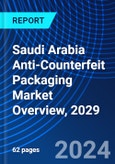This report comes with 10% free customization, enabling you to add data that meets your specific business needs.
1h Free Analyst TimeSpeak directly to the analyst to clarify any post sales queries you may have.
This coincided with the country's economic growth and rising consumer demand for luxury and high-value goods, making them prime targets for counterfeiters. Early solutions focused on overt security features like holograms and tamper-evident seals. However, as counterfeiters became more sophisticated, the market shifted towards covert technologies like invisible inks and track-and-trace systems. Today, the focus is on integrating these technologies seamlessly into packaging designs, balancing security with aesthetics and sustainability.
According to the research report "Saudi Arabia Anti-Counterfeit Packing Market Overview, 2029,", the Saudi Arabian Anti-Counterfeit Packing market is projected to add more than USD 300 Million from 2024-2029. The Saudi Arabian anti-counterfeit packaging market is being driven by several key factors. Firstly, there's a growing awareness among brands about the risks and costs associated with counterfeiting, leading them to invest in anti-counterfeit packaging solutions. Additionally, government regulations, such as the SFDA's track and trace mandate and SACO's enforcement efforts, are compelling companies to adopt these measures.
Moreover, consumer demand for authentic products is creating a market for effective anti-counterfeit solutions. Technological advancements, particularly in RFID and blockchain, offer more secure and verifiable options, enhancing their appeal. However, despite the market's potential, challenges persist. These include the high initial cost of implementation, lack of awareness among some brands and consumers, the complexity of integrating anti-counterfeit packaging with existing systems, and the constant evolution of counterfeiting networks, necessitating ongoing innovation in anti-counterfeit solutions. Counterfeiting poses a substantial threat to consumer safety, brand reputation, and economic stability. As a result, the demand for anti-counterfeit packaging solutions has surged globally, with Saudi Arabia emerging as a prominent market for such technologies. Anti-counterfeit packaging refers to measures incorporated into product packaging to prevent unauthorized imitation and ensure product authenticity throughout the supply chain.
The market segmentation for anti-counterfeit packaging in Saudi Arabia revolves around two primary criteria: technology and application. In terms of technology, options include mass encoding, RFID, holograms, forensic markers, tamper evidence, and smart packaging. Mass encoding finds utility in low-value, high-volume goods but faces challenges due to limited security features. RFID, on the other hand, is rapidly gaining popularity, especially for high-value goods like pharmaceuticals and luxury items, driven by affordability and advanced functionalities.
Holograms, though widely used, encounter hurdles with advanced counterfeiting techniques but remain relevant, particularly in protecting luxury goods and brands. Forensic markers are gaining traction for sensitive products like pharmaceuticals, offering covert authentication and traceability. Tamper evidence, essential in many packaging solutions, shows promise for continued development with sophisticated seals and integration with other technologies. Smart packaging, an emerging technology, holds significant potential for growth, particularly for high-value and technologically advanced products, as costs decrease and functionalities improve.
On the application front, pharmaceuticals exhibit the highest demand for anti-counterfeit packaging due to safety and regulatory concerns, employing a wide range of technologies including RFID and track & trace systems. The food & beverage sector is witnessing growing demand for solutions to combat counterfeiting, focusing on tamper evidence and track & trace, while the apparel & footwear industry relies on holograms, RFID, and smart packaging for brand protection and consumer verification. The automotive sector is adopting holograms, forensic markers, and tamper evidence to address safety risks posed by counterfeit spare parts, driven by stricter regulations.
Personal care products are increasingly utilizing holograms, tamper evidence, and forensic markers for brand protection and safety as consumer awareness grows. In the electrical & electronics industry, authentication technologies like holograms, RFID, and forensic markers are employed to combat counterfeiting, fueled by the demand for trusted electronics. Luxury goods, with their high vulnerability to counterfeiting, rely on a myriad of advanced technologies including RFID and smart packaging, with continued innovation crucial to combating sophisticated counterfeiting in the future.
In Saudi Arabia, key policies and regulations shape the landscape of the anti-counterfeit packaging market. The Saudi Anti-Counterfeiting Law, enforced by the Saudi Anti-Counterfeiting Authority (SACO), imposes penalties on counterfeiters and enables SACO to seize fake goods and pursue legal action. The Saudi Food & Drug Authority (SFDA) mandates track and trace systems for pharmaceuticals and medical devices, ensuring packaging carries unique identifiers for verification. The Ministry of Commerce and Investment (MCI) oversees product labeling, intellectual property rights, and consumer protection, indirectly influencing anti-counterfeit packaging practices.
Saudi Customs Regulations empower customs authorities to inspect and confiscate counterfeit products at the border. Certification bodies like the Saudi Standards, Metrology and Quality Organization (SASO) set standards for packaging materials and safety, while international standards such as ISO 12931 and ISO 29133 provide guidelines for compliance with global best practices. Religious regulations dictate that packaging must adhere to Islamic principles regarding materials and symbols. Additionally, data privacy laws like the Personal Data Protection Law (PDPL) govern the use of personal data in anti-counterfeit features like track and trace systems.
This product will be delivered within 2 business days.








